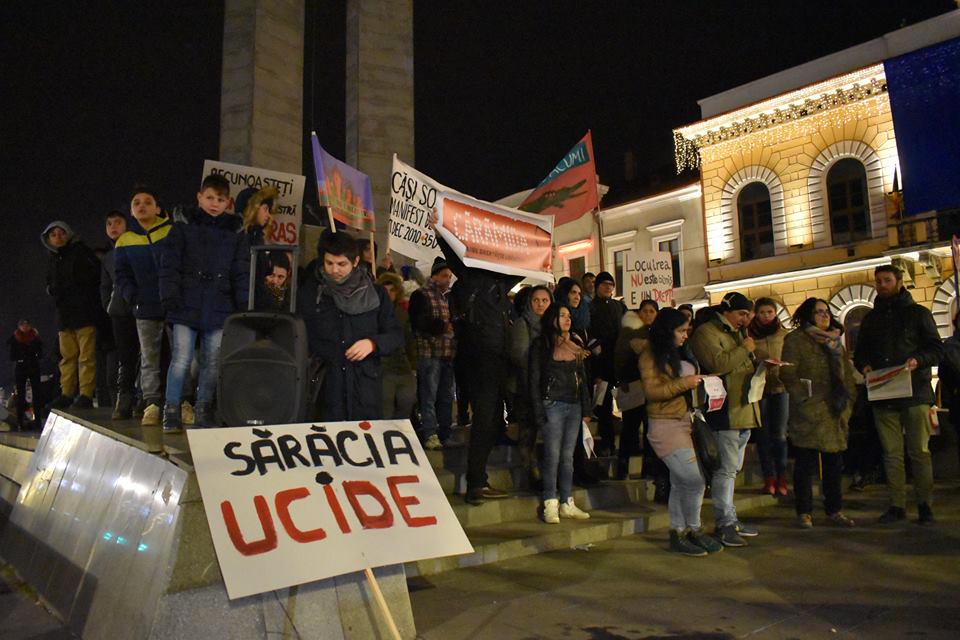This post is part of a feature on “Urban Struggles,” moderated and edited by Raúl Acosta (LMU Munich), Flávio Eiró (Radboud University Nijmegen), Insa Koch (LSE) and Martijn Koster (Radboud University Nijmegen).
The global trend away from rural living and towards urbanization continues unabated. This is so despite high levels of inequality, poverty and forms of exclusion that are part and parcel of city life for the many. Indeed, across the globe, growing numbers of urban dwellers struggle to meet even the most basic needs for housing, security, and income. In response to these challenges, governments have attempted to present solutions that are too often palliative, addressing merely the symptoms of inequalities rather than their causes. In a similar vein, highly mobile policies are frequently implemented under the banner of terms like “good governance,” “participation” or “crisis management” that reinforce the social exclusion of the most marginalized, often contrary to their stated intentions (Peck and Theodore 2015). Cases of such exclusion include mass evictions, the rise of gated communities, the securitization of urban spaces, shifts towards austerity measures, punitive policies of migrant populations, and the regulation of the informal sector.
As such, cities are places of multiscale struggle (Mollona 2014) where a variety of different actors, from (inter)national and local government bodies to charities, corporations, grassroots movements and citizens make competing claims of legitimacy and express visions for future living (Harvey 2003, Susser and Tonnelat 2013, Lazar 2017). Indeed, cities have become focal points for various class struggles.
Based on a panel held at the IUAES conference in Poznań, Poland, in August 2019, this collection of papers addresses both the various forms of resistance to, and the reproduction of, exclusionary urban policies. Our main ambition is to expand important conversations in anthropology on urban mobilizations emerging from Henry Lefebvre’s “right to the city” and the “production of space” via a focus on the character and persistence of urban struggles (Lefebvre 1991, Banerjee-Guha 2010, Kalb and Mollona 2018, Koster and Kolling 2019). In this post and the contributions to this feature blog, we understand the study of urban struggles as a collection of productive tensions where governance, resistance and solidarity play out in plural and often unexpected ways within global frameworks of highly unequal regimes of accumulation (Susser 2014).
Urban governance: facing challenges and reproducing inequality
Cities grow by layers of time. This is related to both population growth and changes to the built environment. The number of urban dwellers grows not merely through the reproduction of those already living in urban spaces, but through constant immigration that originates in the countryside from surrounding areas and often from much further afield (Davis 2006). Many migrants who are attracted to urban life consider the city to be full of opportunities that cannot be found elsewhere, even as they find upon arrival that their status and rights to the city are often less recognized and sometimes actively suppressed compared to those of more established populations. The steady growth of cities across the planet has created, in turn, new pressures on local government bodies to keep up with the provision of infrastructure, public goods and employment opportunities needed to meet even the most basic demands for living (Caglar and Schiller 2018).
To respond to the challenges faced by urban dwellers and the risk of social turmoil these entail, governments have come to implement a range of policies aimed at improving the urban lived environment. Governments thus tend to see larger cities both as centers where political legitimacy is built and where their ideologies and visions of the future take shape. Because of this combination, cities have also become sites of experimentation for states, where policies are tested before being rolled out more broadly. Often sold under the banner of buzzwords like “civilizing cities”, promoting “active participation”, “community building” or embarking on “crisis management”, these policies promise to improve the quality of life and built environment of the most vulnerable (Nuijten 2013, Schinkel 2010, Masco 2017). To do so, many come to rely on new forms of technocratic governance that uses the matrix of statistics and quantitative science in implementing various political and legal projects, ranging from social housing provisions to environmental policies to regeneration projects (Koch 2018).
While these various initiatives may have ostensibly democratic goals, their implementation all too often reproduces the structural conditions of exclusion that they are meant to address (Alexander, Bruun and Koch 2018). The objective or neutral language of urban initiatives disguises the complex ways in which these policies are embedded in, and further promote, capitalism’s circuits of value and accumulation. Decisions by government policy makers usually favor the segments of the population who already hold most capital in the city. Meanwhile, urban infrastructure projects and regeneration initiatives attract real estate developers and to gentrify neighborhoods (Evans 2016). Both processes are aggravated when budget cuts and austerity measures fuel the outsourcing of urban governance to third-party actors – private companies and non-governmental organizations alike – that are often unwilling and sometimes unable to adequately provide public goods.
Urban struggles as resistance and solidarity
Cities, as sites where different actors compete for legitimacy, are the locus of productive urban struggles. We use the term urban struggle to refer to the complex and varied sets of negotiations through which city dwellers, grassroots movements, activist groups and political and development brokers critically engage with the claims to legitimacy and visions for the future that are promoted by official channels. As these groups face a wide variety of problems from insufficient housing (Cohen 2014) and infrastructure to environmental hazards, they develop an equally vast repertoire of resistance strategies, tactics and responses. These include, as the contributions to this feature show, amongst others, squatting initiatives, land occupations, grassroots art exhibitions, and the expansion of informal ties that are often viewed with suspicion by the state. There is thus a constant push and pull between dispossession and resistance, austerity and solidarity, exclusion, and inclusion unfolding in urban spaces.

Yet, creative engagements seemingly opposed to neoliberal urban policies do not produce unequivocal forms of resistance, less even a singular anti-capitalist stance against structures of oppression (Kalb and Mollona 2018). On the contrary, ambiguities and contradictions prevail as citizens move within the same unequal processes of accumulation that frame official policies (James and Koch 2020). One example of this concerns the case of slum dwellers who aspire, above all, to become landlords and rent out rooms to even poorer slum dwellers under extractive conditions. Hence, the practices of the poor are not necessarily expressions of unequivocal solidarity and care (Palomera 2014). Likewise, social movements and grassroots initiatives, while often deploying a universal language of humanitarianism, may only benefit particular groups of urban dwellers, thus generating resentment and jealousy amongst those excluded (Wilde 2020). Urban struggles do not necessarily produce a better city, even as their spokespersons claim to speak on behalf of the most vulnerable and excluded (Gutierrez-Garza 2020).
Acknowledging the contradictions that are at the heart of urban struggles opens the space for a particular analytical lens: one that conceptualizes cities as assemblages of productive tensions where a variety of actors, groups, movements and policy makers define, and continuously compete over, the meanings of urban citizenship, “rights to the city”, and democratizing access to infrastructures and public goods. This, in turn, can help us see how social responses, including those of social movements, grassroots initiatives, and local care networks, should not be romanticized as simple expressions of political resistance. Neither, however, does such a lens lend itself to a dystopian view in which capitalism erases all alternatives. Instead, cities emerge as places of ongoing, open-ended power struggles. Ethnography, with its focus on the lived experiences of urban dwellers, is particularly well placed to capture both the moments of solidarity that continue to exist and the wider forces disabling them. The papers in this feature seek to do precisely this.
Ethnographies of urban struggles
Our blog contributions highlight urban struggles and their complicated politics in a range of settings, taking the reader from Latin American’s mega-cities to European urban centers to recent urban developments in Asia. In Mexico City, Raúl Acosta analyses how cycling activists, intent on improving the infrastructure of the city, engage in a project that uses technical expertise to put forward a moral project of improving life in the city. However, the capacity to claim such moral projects is not evenly distributed, as activists on the “periphery” – both in the spatial and the social sense of the word – find that they lack the economic and cultural capital to be heard by power holders. In Brazil, questions of resistance and power are also at the center of the urban activism practiced by the poor. Sven da Silva explores how occupancy urbanism of the poor is negotiated in the context of development projects in the fast-growing Recife, in Brazil. Here, community leaders engage in political activities to resist real state pressure and in favor of what they view as community interests. Adam Moore’s contribution presents the hopes and dreams of victims of development in Medellín, Colombia. Looking at practices of autoconstruction, he explores the ‘human cost’ of ‘urban renovations’ and challenges the hegemonic narrative about urban transformation in Medellín, which heralds the local government as exemplary in its commitment to equitable and pro-poor urban development interventions.
In Europe, struggles over governing urban populations and spaces similarly abound, bringing together a complex network of third sector organizations, private actors, Universities and state bodies. In the “policy laboratory city” of Rotterdam, frequently celebrated for its allegedly inclusive and innovative social policies, conflicting views over how to govern migrant populations have opened the space for new technologies of control. Here, Lieke van de Veer shows that the effort on the part of local groups claiming a role on the reception infrastructure of migrants often become riddled with internal tensions over funding and resources as different groups are unequally positioned to access these competitive funds. Meanwhile, in the UK, two of our blog contributions focus in more closely on questions of inequality in the city. Sarah Winkler-Reid’s work on Newcastle-Upon-Tyrne focuses on the university’s role in the network of actors influencing urban development proclaiming to create the “good city”. Here, the rapid growth of privately owned, mostly purpose-built student accommodation, create new forms of inequality in the city’s historical centre. In her contribution on the voluntarization of welfare advice in Manchester, Janne Heederik demonstrates how a withdrawal of state funding and a shift of tasks and responsibilities from government officials to citizens have transformed the landscape of welfare provision. If solidarity is the basis of the relationships between claimants and non-state advisers, they are also marked by tensions that are the result of the structural shifts austerity has imposed on the welfare system.
In all of the contributions considered thus far, concessions and gains experienced by one urban group can simultaneously constitute a loss or betrayal for another. Indeed, this insight is also key to Anne-Christine Trémon’s ethnography of the city of Shenzhen in the People’s Republic of China (PRC), where the authorities’ attempts to gain the status of a “national civilized city” – a status bestowed by the PRC government in recognition of “quality of life and a higher degree of urban civilization” – have introduced new forms of inequality for migrant populations vis a vis the typically much wealthier natives. Trémon makes use of the concept of “variegated governance” to make sense of how cohabiting residents in the same territorial unit receive differential treatment depending on their respective economic valorization and the political acknowledgement of their social worth. Finally, in Ezgi Guler’s contribution on urban Turkey, we move closer to questions about the possibility of collective resistance to oppressive urban structures and policies. Yet, once more, while the transgender sex workers with whom she carried out fieldwork rely on dense networks of mutual support and care, these rarely translate into collective political action as material pressures, including financial stress, inequality, competition and stigma also make workers deeply suspicious of one another.
This project has received funding from the European Research Council (ERC) under the European Union’s Horizon 2020 research and innovation programme (grant agreement No. 679614).
Raúl Acosta is a postdoctoral researcher at the Ludwig Maximilian University in Munich. He currently carries out research on urban activism in Mexico City in a sub-project of the German Research Foundation (DFG) funded Urban Ethics Research Group. His monograph “Civil Becomings: Performative Politics in the Brazilian Amazon and the Mediterranean” examines activist and advocacy networks.
Flávio Eiró is a postdoctoral researcher at the Department of Anthropology and Dvelopment Studies at Radboud University, Nijmegen. He has conducted ethnographic research on electoral politics and conditional cash transfers in Northeast Brazil, and currently works in the ERC funded project “Participatory urban governance between democracy and clientelism: Brokers and (in)formal politics”.
Insa Koch is Associate Professor in Law and Anthropology at the London School of Economics. Her recently published monograph “Personalizing the State: an Anthropology of Law, Politics and Welfare in Austerity Britain” offers an ethnographic study of the crisis of democracy and urban citizenship in Britain.
Martijn Koster is Associate Professor at the Department of Anthropology and Development Studies at Radboud University, Nijmegen. Currently, he leads the ERC funded project “Participatory urban governance between democracy and clientelism: Brokers and (in)formal politics”.
References
Alexander, C; M Hojer Bruun; I Koch. 2018. Political economy comes home: on the moral economies of housing. Critique of Anthropology 38(2): 121–139
Banerjee-Guha, S. (Ed.). 2010. Accumulation by dispossession: Transformative cities in the new global order. SAGE Publications India.
Caglar, A. S. and N. G. Schiller. 2018. Migrants & city-making: dispossession, displacement, and urban regeneration. Durham, Duke University Press.
Cohen, Yves. 2014. “Crowds without a master: A transnational approach between past and present,” FocaalBlog, November 10, www.focaalblog.com/2014/11/10/yves-cohen-crowds-without-a-master-a-transnational-approach-between-past-and-present.
Davis, M. 2006. Planet of slums. London, New York, Verso.
Evans, G. 2018. London’s Olympic Legacy: The Inside Track. London, Palgrave MacMillan.
Gutierrez Garza, Ana. 2020. “Te lo tienes que currar”: enacting an ethics of care in times of austerity. Ethnos, Published online.
Harvey, D. 2003. The right to the city. International journal of urban and regional research, 27(4), 939–941.
Kalb, D. and M. Mollona. 2018. Worldwide mobilizations: class struggles and urban commoning. New York, Oxford, Berghahn Books.
Koch, I. 2018. Personalizing the state. An anthropology of law, politics, and welfare in austerity Britain. Oxford, Oxford University Press.
Koch, I. and D. James. 2020. The state of the welfare state: advice, governance and care in settings of austerity. Ethnos, Published online.
Koster, M. & M. Kolling (eds). 2019. Betrayal in the city: Urban development across the globe [Special Issue]. City & Society 31(3).
Lazar, S. 2017. The social life of politics: Ethics, kinship, and union activism in Argentina. Redwood City, Stanford University Press.
Lefebvre, H. 1991. The production of space. Oxford, Basil Blackwell.
Masco, J. 2017. The crisis in crisis. Current Anthropology, 58(S15), S65-S76.
Mollona, Massimiliano. 2014. “The Brazilian ‘June’ revolution: Urban struggles, composite articulations, and new class analysis,” FocaalBlog, October 28, www.focaalblog.com/2014/10/28/massimiliano-mollona-the-brazilian-june-revolution-urban-struggles-composite-articulations-and-new-class-analysis.
Nuijten, M. 2013. The perversity of the “Citizenship Game”: Slum-upgrading in the urban periphery of Recife, Brazil. Critique of Anthropology, 33(1), 8–25.
Palomera, J. 2014. Reciprocity, commodification, and poverty in the era of financialization. Current Anthropology 55(S9): S105-S115.
Peck, J., & Theodore, N. 2015. Fast policy: Experimental statecraft at the thresholds of neoliberalism. Minneapolis, University of Minnesota Press.
Susser, I., & Tonnelat, S. 2013. Transformative cities: the three urban commons. Focaal, 2013(66), 105–121.
Susser, Ida. 2014. “Re-envisioning social movements in the Global City,” FocaalBlog, 12 November, www.focaalblog.com/2014/11/12/ida-susser-re-envisioning-social-movements-in-the-global-city.
Wilde, M. 2020. Eviction, Gatekeeping and Militant Care: Moral Economies of Housing in Austerity London. Ethnos, Published online.
Cite as: Acosta, Raúl, Flávio Eiró, Insa Koch and Martijn Koster. 2020. “Introduction: Urban struggles: governance, resistance, and solidarity.” FocaalBlog, 2 July. http://www.focaalblog.com/2020/07/02/raul-acosta-flavio-eiro-insa-koch-and-martijn-koster-introduction-urban-struggles-governance-resistance-and-solidarity/

